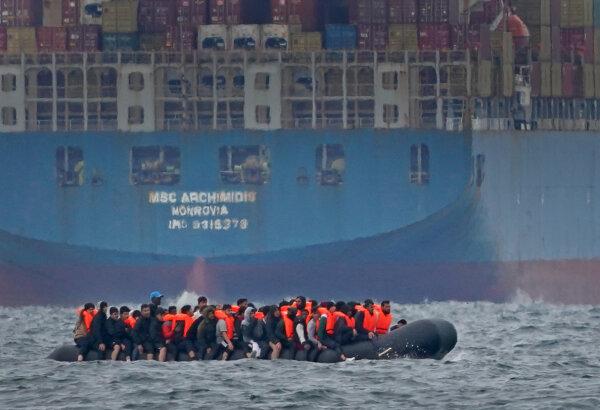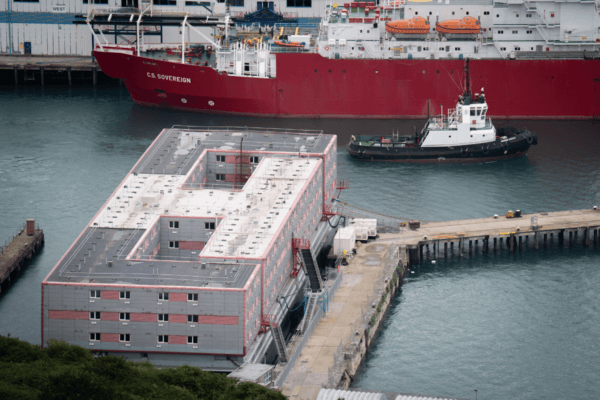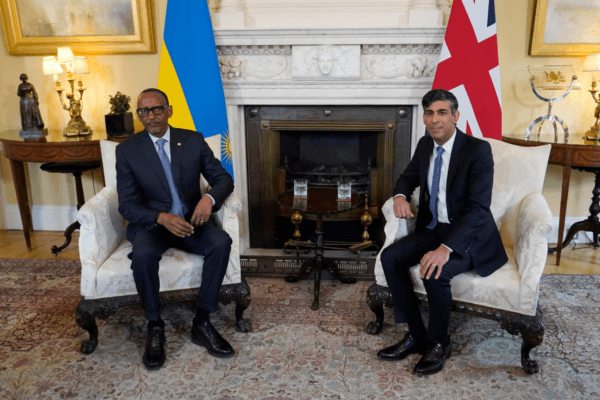More than a quarter of overseas aid was spent on supporting asylum seekers and refugees in the UK for the second year in a row, government figures have revealed.
Data published by the Foreign, Commonwealth, and Development Office (FCDO) on Wednesday showed that in 2023, £4.28 billion was spent in the form of “in-donor refugee costs,” equalling 27.9 percent of the total Official Development Assistance (ODA) for the year.
As with previous years, the FCDO said the majority of the increase was “driven by an increase in ODA eligible support costs for asylum seekers in the UK.”
Last year, the Home Office spent £2.96 billion of ODA, an increase of £559 million (23.3 percent) on the year before.
‘Inequitable and Inefficient’
International rules allow governments to include the first year of in-country refugee and asylum seeker costs to count as ODA. These expenses include payments for transport to the host country, food, shelter, and training.However, the practice has garnered criticism for reducing the amount of aid spent overseas.
Chairwoman of the International Development Committee Sarah Champion said the increasing in-donor refugee costs were “deeply worrying.”
“We have expressed our concerns on a number of occasions and ministers are still not listening,” the Labour MP said.
“Almost 30 percent of our aid is being spent on refugee costs—nearly five times our bilateral spend on emergency international humanitarian aid. We do not believe that UK ODA is being spent in the spirit of the OECD rules,” Ms. Champion added.
Tamsyn Barton, chief commissioner of the Independent Commission for Aid Impact, said allowing the Home Office to spend “an unlimited amount” on supporting asylum seekers at the expense of the international aid budget raised concerns about value for money.
UK Spent Highest Proportion of GDP on Aid Since 2021
Last year, the UK spent 0.58 percent of GDP on foreign aid, the highest proportion since the target for spending was temporarily lowered from 0.7 percent to 0.5 percent in 2021. Then-Prime Minister Boris Johnson cut foreign aid owing to the economic impact of the COVID-19 lockdowns.A government spokesperson said the UK spent more than £15 billion last year “on life-saving humanitarian aid in Gaza, in Sudan following the coup, and in Turkiye and Syria after the earthquake.”
“Our spend in 2023 also helped fragile states to access finance, millions of women globally to receive family planning support, and is tackling the effects of climate change. We are also nearly doubling our spend in low-income countries this financial year,” the spokesperson said.

They added that last year’s budget had been boosted by additional funding to refugees in the UK “who have escaped oppression and conflict overseas, including from Ukraine and Afghanistan.”
150 Migrant Hotels Will Be Closed by May
Also on Wednesday, the Home Office announced that it will have closed some 150 migrant hotels by May.The department said there are now 20,000 fewer migrants staying in hotels than six months ago, down from more than 56,000 at the end of September.
Home Secretary James Cleverly said the process will continue “until the last hotel is closed.”
“We promised to end the use of asylum hotels and house asylum seekers at more appropriate, cheaper accommodation; we are doing that at a rapid pace,” Mr. Cleverly said.

Last year, the Home Office spent some £8 million a day to house thousands of migrants in hotels while the government worked on establishing alternative forms of housing.
By the end of this month, the Home Office will have spent at least £230 million developing four major long-term migrant accommodation projects: a former student accommodation site in Huddersfield, West Yorkshire; the Bibby Stockholm barge in Portland, Dorset; and the former RAF bases at Scampton, Lincolnshire, and Wethersfield, Essex.
Flights to Rwanda Start ‘in Spring’
The Home Office says these plans will offer better value for money for taxpayers than using hotels. The department added that when the government passes the Safety of Rwanda (Asylum and Immigration) Bill it will “get flights off to Rwanda” and deter further English Channel migrant crossings.“It is only when people are discouraged from taking those journeys that we can end asylum hotel use for good,” the Home Office said.

On Tuesday, Prime Minister Rishi Sunak welcomed Rwandan President Paul Kagame to Downing Street, where they discussed the UK and Rwanda Migration and Economic Development Partnership, which includes the agreement to send asylum seekers to Kigali.
The prime minister’s office said he and Mr. Kagame look forward to flights taking off for Rwanda in the spring.
The Rwanda bill returns to the House of Commons on Monday.







